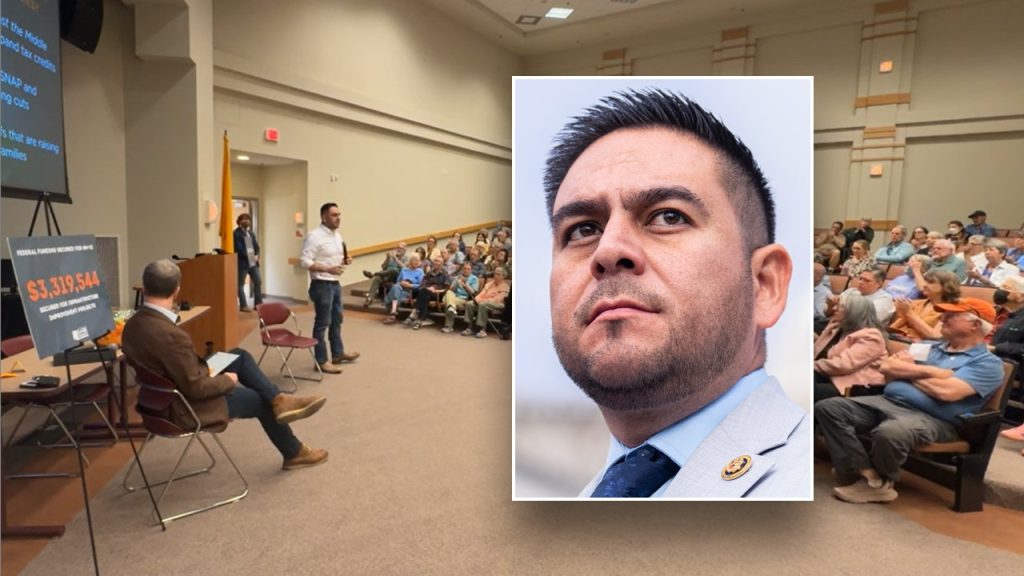In a recent event, Rep. Gabe Vasquez, a Democratic congressman from New Mexico, articulated his dissent regarding the Laken Riley Act, highlighting the implications of deporting illegal immigrants on the integrity of American democracy. He accused the previous Trump administration of jeopardizing citizen safety amid increasing deportations, including that of Kilmar Abrego Garcia. This ongoing debate exemplifies the larger tensions surrounding immigration reform and public safety in the U.S.
| Article Subheadings |
|---|
| 1) Background on the Laken Riley Act |
| 2) Vasquez’s Opposition Explained |
| 3) Response from Republican Lawmakers |
| 4) The Case of Kilmar Abrego Garcia |
| 5) Broader Implications of the Debate |
Background on the Laken Riley Act
The Laken Riley Act came into existence in response to a tragic incident in February 2024 when Laken Riley, a 22-year-old nursing student, was murdered while jogging in Athens, Georgia. The act, which was signed into law by former President Donald Trump on January 29, 2025, mandates the detention of illegal immigrants if they are arrested or charged with a violent crime. This law is seen as an effort to enhance public safety by specifically targeting undocumented individuals who commit crimes. The legislation reflects a growing concern among lawmakers and constituents alike regarding the intersection of immigration and violent crime, particularly in the context of high-profile cases like that of Riley’s murder.
Vasquez’s Opposition Explained
During an April event, Rep. Gabe Vasquez expressed his opposition to the Laken Riley Act, stressing that voting against such legislation requires courage. He articulated that he cast his vote against the law, stating, “Because due process is a fundamental part of who we are as Americans.” Vasquez’s stance is rooted in a commitment to fair legal processes, suggesting that the act’s provisions may not adequately ensure the rights of individuals involved. His statements during the event received enthusiastic support from his constituents, indicating a divide among voters about the approach to immigration and law enforcement.
Response from Republican Lawmakers
Republican representatives, notably Rep. Tony Gonzales, have defended the Laken Riley Act as necessary for enhancing border security, which they argue has been neglected in the preceding administration. Gonzales remarked on the significance of voting in favor of the act, asserting that it addresses safety concerns that emerged from years of inaction. He emphasized that voters are seeking community safety and law enforcement restoration, which he believes the Laken Riley Act delivers. This bipartisan support indicates a wider acceptance of stricter immigration measures among certain factions of the GOP, while also highlighting the ongoing battles between different political perspectives on the issue.
The Case of Kilmar Abrego Garcia
The case of Kilmar Abrego Garcia, who is suspected of being involved with the violent MS-13 gang, further complicates the immigration discourse. Following his deportation to El Salvador, Garcia became a focal point for critics of Trump’s immigration policies. It was reported that he had previously been pulled over driving an SUV allegedly connected to human smuggling. The juxtaposition of his deportation against the backdrop of increasing gang violence has led to debates on the ethics and efficacy of current immigration policies. Despite the Trump administration’s assertion regarding the necessity of such deportations for public safety, legal challenges emerged, including judicial orders weighing in on the justification for his removal.
Broader Implications of the Debate
The ongoing dialogue surrounding the Laken Riley Act and figures like Kilmar Abrego Garcia reflects broader societal concerns about immigration, safety, and legal rights. As different stakeholders articulate their views, the political landscape reveals an intricate tapestry of opinions about how to effectively manage immigration while ensuring the safety of American citizens. Critics of the recent legislative developments argue that they may lead to unjust deportations of individuals who have not demonstrated violent tendencies, while supporters maintain that strict measures are vital to preventing future crimes. This debate is ongoing, with significant implications for future immigration policies and community safety initiatives in the United States.
| No. | Key Points |
|---|---|
| 1 | The Laken Riley Act requires detention of illegal immigrants charged with violent crimes. |
| 2 | Rep. Gabe Vasquez opposes the act, emphasizing the need for due process. |
| 3 | Republican lawmakers argue the act restores law and order after years of inaction. |
| 4 | Kilmar Abrego Garcia’s deportation has sparked significant legal and ethical debates. |
| 5 | The debate reflects broader concerns about immigration policy and public safety. |
Summary
The ongoing discussions surrounding the Laken Riley Act and immigration culminate in a complex debate about public safety, individual rights, and the implications of policy decisions. With opposing views from key political figures and activist groups, the ramifications of these debates will likely shape the future of immigration reform and law enforcement strategies in the United States. Understanding the perspectives and motivations behind these legislative actions is essential for grasping their potential impacts on American communities.
Frequently Asked Questions
Question: What is the Laken Riley Act?
The Laken Riley Act is a law that mandates the detention of illegal immigrants who are arrested or charged with violent crimes, aimed at enhancing public safety.
Question: Why did Rep. Gabe Vasquez vote against the Laken Riley Act?
Rep. Gabe Vasquez voted against the Laken Riley Act due to concerns regarding due process and the rights of individuals involved in immigration enforcement.
Question: What implications does the case of Kilmar Abrego Garcia have on immigration policy?
The case of Kilmar Abrego Garcia and his deportation has raised important ethical and legal questions about immigration policy, reflecting the need for balanced approaches to public safety and individual rights.


